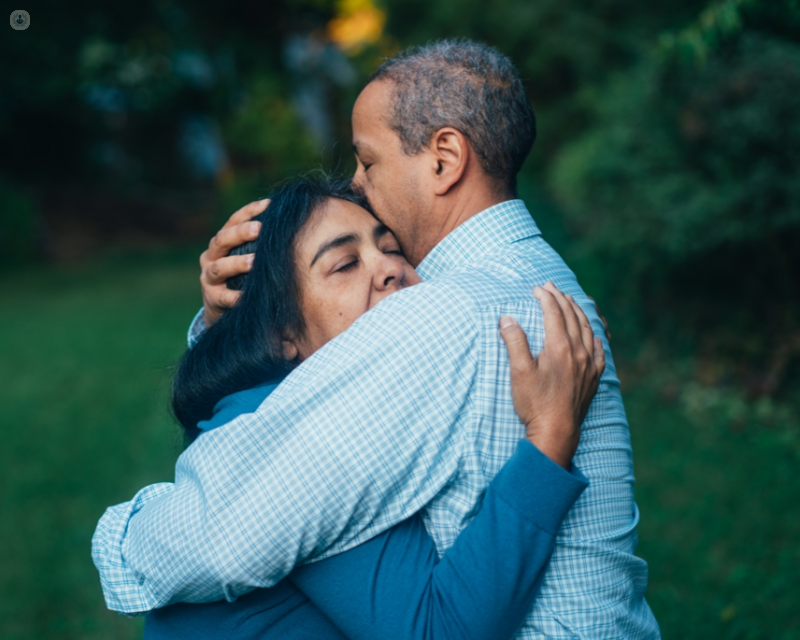What are the emotional and behavioural effects of a stroke?
Escrito por:Recently, studies have suggested that COVID-19 could increase the risk of stroke in some people.

We decided to catch up with Dr Daniel Ghossain, to discuss the different types of strokes and how they can affect patients on an emotional and behavioural level. We also discussed how patients are assessed and the type of therapy that can be offered as treatment.
In what way can a person change after a stroke?
Well, a person can change in numerous different ways, stroke can affect cognitive functioning. It can:
- affect memory and attention skills.
- cause language disorder.
- cause loss of function.
The effects largely depend on the type of stroke. An Anterior Cerebral Artery Stroke can affect every day behaviour, examples of executive functions. Planning an organization, automatic responses, impulses, our ability to sustain attention and control distractibility.
ACA stroke
An ACA stroke can also affect voluntary movement and can result in haemorrhage, it can affect part of the body or one side and can result in dyspraxia.
MCA Stroke
An MCA stroke can affect our memory as it affects the primary part of the brain the temple lobes, the temple lobes is the most important part. A middle cerebral artery stroke affects the middle part of our brain.
The MCA stroke also affects the ability to affect others, cerebral artery mainly provides exsolve which is responsible for vision.
Vertebrobasilar Stroke
Vertebrobasilar stroke can affect vision, language, movement, temperature sensation, depending on where and the it may be affected.
It can affect people’s personality particularly if the frontal lobes and limbic system is affected by the stoke. After the stroke a person’s behaviour can be affected and the frontal lobes ability to self-monitor, are these changes permanent, the severity of the stroke, ability to recover and compensate.
People who are older find it harder to recover especially if they have had previous symptoms of stroke.
If functioning hasn’t spontaneously resolved within that time then it’s unlikely to happen to after, there’s a risk of vascular dementia and it can affect people in different ways, although most people are like to see most improvement in first few weeks of recovery.
Are these changes permanent?
Yes and no. It depends on the type of stroke and the individual brain to recover. A person may recover completely, partially or barely recovers. Depends on age, previous history of stroke.
Chemical activity in the brain can lead to a stroke. One way that could happen is a possible increase of a stroke.
In what ways do you help your patients? (treatments, services, etc.)
Assessment
People who have the stroke have longer more in-depth cognitive assessment, further down the line as its often easier to reach a conclusion at the post-acute stage.
An assessment is done at this point to have a more precise snapshot of cognitive difficulties that a patient may have, to assess the initial damage and the cognitive functions that have been affected, to monitor patients progress.
A cognitive assessment – to check for loss of functioning
Cognitive interventions – assessing patients’ mood following a stroke. Increased low mood, anxiety, depression etc.
Treatment is bespoke because each injury is unique to individual. Treatment takes into account the age of the patient. To treat patients properly, it may involve supplying external support, training family, professional support workers and rehabilitation assistants.
If there is persistent low mood for anxiety there are interventional methods that can be offered.
Assess any changes in a patient’s mood as a result of stroke. The assessment will inform the treatment.
How can this affect the patient’s family and what can you offer them?
With brain injury or stroke it doesn’t just affect the patient but their relatives, it can cause caregiver strain, burden, psychological distress, anxiety or depression, financial hardship and financial pressures.
If the patient has children it can affect their ability to care for them. A stroke can also lead to changes, power shifts for the person who has the stroke and the person or spouse.
The breadwinner can become dependent, there can also be ambiguity in the roles of the spouse or partner, as a spouse may have to adapt from being a lover to a caregiver.
Caregivers are more likely to be depressed if the stroke survivor is and vice versa. Couple affected by acquired brain injury or stroke relationship and sexual difficulties, motivation libido can be affected as result of stroke and increased incidence of divorce.
I offer therapies, strategies for patients, reducing caregiver strain and burden, I provide psychological therapy including family, educational materials and some form of emotional containment for the family.
Can therapy be provided via a remote appointment?
Psychological therapy can be provided over an e-Consultation, I would say it isn’t the case, it does affect the therapy client dynamic in some ways, but if that is the preference, then it can be an effective way of providing therapy. However, cognitive rehabilitation would be more difficult as it involves the need to observe the individual in a living environment, implementing a strategy in an individual environment and a strategy that enables them to be able to see people who are in their workplace.
For the very best therapy and cognitive rehabilitation, we recommend booking an appointment with a highly experienced psychologist such as Dr Daniel Ghossain. Click here to visit his profile today.


